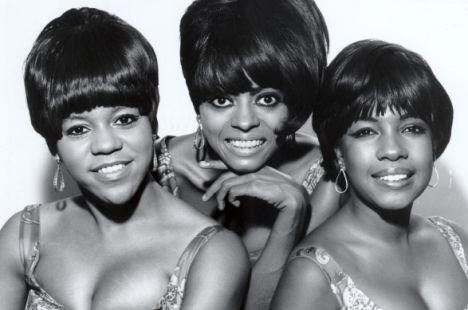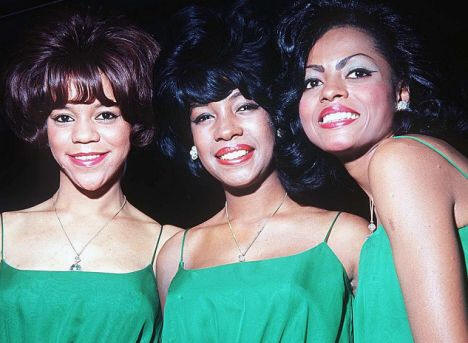Assassinations Ballard, Florence
By
Wendy Leigh
Last updated at 9:00 AM on 22nd May 2008
The little girl's screams pierced the quiet night outside
the small, unprepossessing brick house in a rundown street in
But if her high-pitched wailing woke the neighbours, they just turned over and went back to sleep, reasoning that the girl was probably having a nightmare - and anyway, screams in the night were not unusual in that part of the city.
In a way, they were right. The seven-year-old girl, Nicole, had indeed stumbled into a nightmare - but it was real.
After she had been awoken by a crashing sound, she had run downstairs into the living room and found her mother lying on the carpet, foaming at the mouth.
The unconscious woman was taken to
And there the story would have ended that night of February 22, 1976, but for one thing: the woman who died was Florence Ballard, once the star of The Supremes, one of the most successful groups of all time.

Mystery: Florence Ballard (right), who founded The Supremes, was forced out of the group
Ballard had been wealthy, famous, feted and considered a better singer than Diana Ross, her fellow Supreme who eclipsed, then dethroned her.
This week, a major exhibition opens at
To the many thousands of Supremes fans, the exhibition represents yet another sparkling tribute to the legendary girl group.
But to Florence Ballard's surviving family, the glamour and the glitter has long since worn off.
After the recent discovery of eight hours of taped
interviews with
More than 32 years later, her sister, Maxine, now 65,
firmly believes
"We were told that my sister had died of coronary artery thrombosis, but she didn't have a history of heart disease," she said this week.
"There was no trace of alcohol or barbiturates in her system, but there was this brown cereal-type substance which was never identified.
"I believe she was killed because someone wanted to silence her."
But who? Maxine admits that she has privately confronted the man she suspects of being responsible for her sister's death.
Yet a close examination of the tragic story of Florence Ballard, her climb to stardom and how she was drummed out of the group and then died penniless, points to Flo's profligate husband, Tommy Chapman, known to have abused her, and who was found dead in 1985.

Diana Ross, centre, only took centre stage in the Supremes when she became Berry Gordy's lover
In the newly-released eight hours of taped interviews
Gordy, now 78 a former professional boxer turned record producer, launched Tamla Motown records with just $800 in 1959.
He had an extraordinary ability for spotting talent, including the Jackson 5, The Supremes and Smokey Robinson And The Miracles.
Gordy gave the world a whole new sound, which became known simply as "Motown".
He would frequently promote some artists at the expense of others, ruthlessly cutting from his roster of stars any which failed to please him.
He is a formidable man to take on in any circumstances.
"I began to get scared. I don't know why, I just had a fear."
The bubbly teenager with the big voice, honed during a childhood of gospel singing in her local church, was overflowing with talent.
Suddenly, here was
"Flo thought
Canny and set on creating a black girl group capable of conquering the predominantly white pop music world, Gordy became a Svengali to Florence and the two friends she invited to join her.
Soon, Flo and her pals, Mary Wilson and Diana Ross, became
The Primettes, then - on

Florence, left, thought of Motown boss Berry Gordy as a father figure - until he dropped her from the group
Shepherded by Gordy, they became a pop sensation, crossing all racial barriers and making it to the top.
Their first hit record, Where Did Our Love Go?, went to Number One, and stayed there for 11 weeks. Hit after hit followed.
Flo was initially The Supremes' lead singer, but soon the ambitious Diana Ross started to steal the limelight from her, and a bitter rivalry ensued.
What
With Gordy on Ross's side, there could be only one winner. Gordy was intent on edging Flo out of the group she'd founded.
Aware that she could out-sing and upstage Diana, he wanted Flo out of the group altogether, and had a replacement for her waiting in the wings - Cindy Birdsong.
Florence Ballard gave her last performance as a Supreme at
the Flamingo Hotel,
The morning after, Berry Gordy called her and coldly informed her that she was fired.
She and Gordy fought all morning, until, finally beaten
down,
Immediately afterwards, the group became Diana Ross And The Supremes. Florence Ballard's career was over at the age of 24.
During her years with The Supremes, the group routinely grossed $100,000 in ten days of touring, and their hits made millions.
Yet Gordy had kept the girls on a weekly allowance of just $225, and deducted all their recording and touring expenses from their royalties.
When Flo finally demanded to see statements, there were none.
Distraught, she sued Gordy for her missing millions, but lost her case. Florence Ballard, the girl who had founded The Supremes, was left with a settlement of just $160,000.
She began to drink heavily, and during her drunken binges,
would walk the streets of
"I kept saying: 'The money's gone, the house is gone and the car is gone. I just don't care any more.' I thought about suicide."
But however broken
In 1975, when she began taping her memoirs,
That autobiography would have lifted the lid on The Supremes, Motown and Berry Gordy, the Svengali who had made and then broken her.
Fortunately for Gordy, that book was never written because
"So many lies were told," Maxine recalls. "The rumour was put about that she had died of drink or an overdose, but that isn't true."
Peter Benjaminson, who was co-writing
However, according to assistant medical examiner James Mullaney, who performed the autopsy, only a minuscule amount of the antidepressant Seniquan was found in Flo's body, along with a trace of alcohol.
The autopsy report concluded that she had died of a combination of a blood clot, hypertension, and heart disease.
But what was the
unidentified brown substance found in her stomach? Was some substance
administered to
Maxine is determined to find out what really happened, hence her campaign to have her sister's body exhumed and new tests carried out.
To many, it may seem that after almost 30 years it would be
better to let matters rest.
But her family wants to know what happened. Maxine said: "My sister was healthy, she was happy, she loved her children and she had big plans for the future.
"I don't believe that she died of natural causes. She was outspoken and talking too much, and I believe that she was killed."